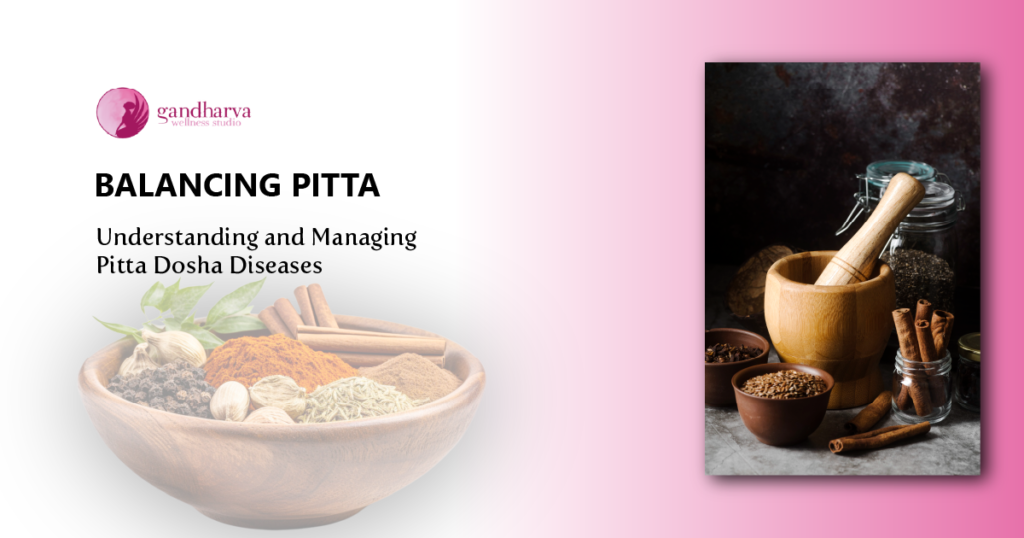
What is Pitta Dosha?
Definition of Pitta Dosha in Ayurveda
- Pitta dosha is one of the three fundamental energies in Ayurveda, associated with fire and water.
- It governs digestion, metabolism, energy production, and the transformation of thoughts and emotions.
- Pitta dosha is responsible for promoting healthy digestion, strong metabolism, intelligence, and courage when in balance.
Characteristics of Pitta Dosha
- Pitta dosha is characterized by its fiery and intense nature.
- It is associated with the digestive system and metabolism.
- Pitta dosha is responsible for the body’s heat and energy.
Pitta Dosha Personality Traits
- Individuals with a predominantly Pitta dosha are known for their intelligence, courage, and strong metabolism.
- They are often ambitious, confident, and passionate, but can also be hot-headed and impatient.
Signs and Symptoms of Pitta Imbalance
Physical Symptoms of Excessive Pitta
- Skin rashes and acne
- Inflammation and acidity
- Digestive issues, such as bloating and acid reflux
- Headaches and migraines
Emotional and Behavioral Symptoms of Pitta Imbalance
- Irritability, anger, and frustration
- Anxiety and stress
- Depression and mood swings
- Destructive tendencies and violent behaviors
Causes of Pitta Imbalance
Factors that Contribute to High Pitta Levels
- Consuming spicy or acidic foods
- Excessive heat and stress
- Poor digestion and lifestyle habits
- Lack of sleep and relaxation
Lifestyle Habits that Aggravate Pitta
- Eating late at night or skipping meals
- Engaging in intense physical activity or exercise
- Watching excessive TV or screen time
- Consuming excessive caffeine or nicotine
Environmental Factors that Affect Pitta Balance in the Body
- Exposure to extreme temperatures or weather conditions
- Living in a polluted or toxic environment
- Working in a high-stress or competitive job
- Traveling or experiencing jet lag
Managing Pitta with Diet and Nutrition
Foods that Pacify Pitta
- Bitter, astringent, and sweet foods, such as leafy greens, apples, and ripe grapes
- Cooling and calming foods, such as cucumbers, melons, and coconut water
- Ghee and milk products, such as yogurt and cheese
Foods to Avoid for Pitta Balance
- Spicy, sour, and salty foods, such as citrus fruits and processed meats
- Fried and oily foods, such as fried chicken and french fries
- Hot and pungent foods, such as wasabi and horseradish
Importance of a Balanced Diet in Managing Pitta
- Eating a balanced diet that includes a variety of foods can help to reduce Pitta levels and promote overall health.
- Avoiding foods that aggravate Pitta can help to prevent Pitta imbalance and related diseases.
Natural Remedies for Pitta Balance
Herbs that Reduce Pitta
- Turmeric, coriander, cumin, and fennel
- Guduchyadi kwath, Alsactil tablets, and Avipathi choornam
- Bhringaraj, Guduchi, Mint, Shatavari, and Brahmi
Yoga Asanas for Pitta Balance
- Adho Mukha savasana, Garbhasana, Supta matsyendrasana, Janu sirsasana, and Viparita shalabhasana
- Yoga asanas that promote relaxation and reduce stress can help to balance Pitta.
Home Remedies for Pitta Pacification
- Drinking coconut water and consuming cooler liquids
- Massaging cooling oils like coconut oil on the scalp
- Practicing stress management techniques, such as meditation and deep breathing
Ayurvedic Principles for Pitta Management
Understanding the Concept of Agni in Digestion
- Agni is the digestive fire that governs metabolism and energy production.
- A healthy Agni is essential for maintaining Pitta balance and overall health.
The Role of Prakriti in Pitta Balance
- Prakriti is the individual’s unique constitution and personality traits.
- Understanding one’s Prakriti can help to identify potential Pitta imbalances and develop personalized prevention and treatment strategies.
Importance of a Healthy Lifestyle for Pitta Management
- A healthy lifestyle that includes a balanced diet, regular exercise, and stress management can help to reduce Pitta levels and promote overall health.
Pitta and Mental Health
The Connection between Pitta and Brain Function
- Pitta dosha is associated with the brain and nervous system.
- Imbalances in Pitta can affect mental health and cognitive function.
How Pitta Imbalance Affects Mental Well-being
- Pitta imbalance can lead to anxiety, stress, and depression.
- It can also affect cognitive function, memory, and concentration.
Chronic Diseases Associated with Pitta Imbalance
The Link between Pitta Imbalance and Chronic Diseases
- Pitta imbalance is associated with various chronic diseases, such as digestive disorders, skin diseases, and mental health disorders.
How Pitta Pacification Can Prevent Chronic Diseases
- Reducing Pitta levels and promoting Pitta balance can help to prevent chronic diseases and promote overall health.
Prevention and Treatment of Pitta Imbalance
The Importance of Personalized Prevention and Treatment
- Personalized prevention and treatment strategies can help to address individual Pitta imbalances and promote overall health.
How Ayurvedic Principles Can Inform Modern Medicine
- Ayurvedic principles can inform modern medicine by providing a holistic approach to health and wellness.
Conclusion
Summary of Key Takeaways on Balancing Pitta Dosha for Overall Health and Well-being of the Body
- Understanding Pitta dosha and its characteristics is essential for maintaining overall health and well-being.
- A balanced diet, healthy lifestyle, and stress management can help to reduce Pitta levels and promote overall health.
- Ayurvedic principles can inform modern medicine by providing a holistic approach to health and wellness.
